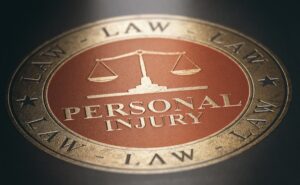If you have injuries resulting from another person's negligence, you might be considering a personal injury lawsuit. This legal action can secure the compensation you deserve for your suffering and losses. You will need outside assistance to determine how best to move forward with your case.
Personal injury lawyers assess the potential of your case before agreeing to represent you. They look for specific elements that establish a solid foundation for a successful legal claim. Here is a general overview of those elements and how your lawyer's experience can be crucial in establishing them for your claim.
Common Types of Personal Injury Cases
Personal injury law covers a range of situations. The most common cases include motor vehicle accidents, slip and fall cases, product liability, medical malpractice, and workplace injuries. Each type requires a different approach and evidence to secure compensation. Your lawyer can appropriately present and handle your case—no matter its type or complexity.
The Emotional and Psychological Consequences of Personal Injury

The impact of a personal injury is not just physical. Accidents can also result in emotional distress and psychological issues, such as post-traumatic stress disorder. Your lawyer will factor these mental health effects into your damage claim and guide you in documenting these issues, ensuring the courts consider them in your case.
Take time to care for yourself following your accident. Follow any care plans set forth by your medical care team, speak with a psychiatrist or therapist as needed, and ensure you rest and relax whenever possible. Caring for yourself during this time can help with a speedy recovery.
Negligence in Personal Injury Cases
Negligence forms the bedrock of personal injury law. Your lawyer's main task is to effectively establish that the party who caused your injury acted negligently. It is a legal term with a specific meaning, and your lawyer will demonstrate how it applies to your case.
The concept of negligence typically involves failure to behave with the level of care that someone of good judgment would exercise under the same circumstances. The behavior usually consists of actions but can also include omissions when there is a duty to act.
Your lawyer plays a pivotal role in proving negligence. They will gather evidence, question witnesses, and apply the law to your specific circumstances. With their knowledge, they will build a compelling case that convincingly demonstrates the responsible party's negligence.
The Role of Duty of Care in Personal Injury
Another crucial element in personal injury law is the duty of care, which refers to a person's legal responsibility to avoid causing harm. In personal injury law, you must establish that the defendant owed you a duty of care.
The duty of care is a legal obligation requiring individuals to adhere to a standard of reasonable care when performing any acts that could foreseeably cause harm. Your lawyer must establish this element to proceed with a case of negligence.
This might involve identifying laws, regulations, or accepted norms of behavior that require the defendant to act (or refrain from acting) in a certain way to prevent harm.
Breach of Duty: The Core of Your Claim
Having established that the defendant owed you a duty of care, your lawyer must prove they breached that duty, meaning they failed to meet their legal obligations, thus leading to your injury.
Your lawyer will gather and present evidence to show the defendant breached their duty of care. Your lawyer may gather evidence in many ways, including examining the event's details, scrutinizing the defendant's actions or inaction, and comparing what they did (or failed to do) with what a reasonable person would have done in the same situation. With a well-argued breach of duty, your lawyer can pave the way to establishing liability in your personal injury claim.
Causation: Connecting the Breach to Your Injuries
After establishing a breach of duty, your lawyer can link that breach directly to your injuries. Courts refer to this as causation. Causation is critical to your personal injury claim, as it directly links the negligent act to the harm suffered.
Causation, in the context of personal injury law, is about demonstrating that the defendant's breach of duty caused your injury. In other words, your lawyer will show that the defendant's negligent behavior is the reason for your suffering, and without their actions, your injury would not have occurred.
Your lawyer can seek to uncover and present evidence that convincingly demonstrates causation. They could review medical records, discuss your case with experts, or reconstruct the accident scene. These efforts aim to build a clear picture linking the defendant's actions (or inaction) to your injury, thus solidifying the foundation of your personal injury claim.
Damages: Quantifying Your Losses
After establishing causation, the next step is quantifying your losses due to the injury. These losses—or damages—cover everything from medical expenses and lost earnings to pain and suffering.
Damages are a central aspect of your personal injury claim; they represent the economic costs, such as medical bills and lost earnings, and non-economic costs, such as physical pain, emotional distress, and loss of enjoyment of life. You need a lawyer to quantify these losses on your own. Collecting and curating the necessary documentation and associated information is stressful and time-consuming.
Your lawyer can play an important role in documenting and proving these damages. They can compile medical bills, calculate lost earnings, and express how your injury has changed your quality of life.
Your lawyer will ensure your damages truly reflect the toll the injury has taken on you. Remember that each case is unique, and your lawyer will tailor the process of documenting and proving damages to your situation.
The Meaning and Implications of Tort Law in Personal Injury Cases
Tort law, which governs personal injury cases, centers on the idea that courts should hold individuals financially responsible for the consequences of their negligent actions or intentional misconduct. By understanding tort law and its applications, your personal injury lawyer can build a compelling case to hold the responsible parties accountable.
The Statute of Limitations in Personal Injury Cases
Understanding the time frame to file your personal injury claim is crucial. This due date, known as the statute of limitations, varies by state and type of injury. If you do not file within this period, you may forfeit your right to compensation.
Your personal injury lawyer is well-versed in these timelines and can file your case within the appropriate timeline, optimizing your chances for a favorable outcome.
The Structure and Process of a Personal Injury Lawsuit
A personal injury lawsuit has several stages: filing a complaint, the discovery process, settlement negotiations, and possibly trial and post-trial motions. Each stage requires a different strategy and an understanding of legal procedures. Your lawyer can navigate these stages for you, making the process less daunting.
Settlement vs. Trial in Personal Injury Cases
Deciding whether to settle or go to trial is a major decision. While settling could result in quicker, guaranteed compensation, you may receive a larger payout with a trial. Many factors come into play, and you need to ask yourself several questions. Do you want to wrap things up quickly and move on, or do you want to see justice done, even if it involves a lengthy trial?
There is no one right answer or correct course of action. Your lawyer can advise on the best course of action, determining the strengths of your case, your potential compensation, and your personal preferences. Take time to decide and determine what is most important to you.
What Is the Value of My Personal Injury Case?
The value of your personal injury case depends on your situation. It is impossible to estimate the value of your case without a detailed assessment of the facts related to your incident and the associated damages. Your lawyer can analyze your case, inform you of the applicable laws, and identify the potential outcomes. They can also use their skill to confirm that your compensation is fair and just.
Possible Outcomes of a Personal Injury Case
The possible outcomes of personal injury cases can vary widely. They can range from a robust settlement to a complete dismissal. Your lawyer can walk you through the various outcomes, prepare you for each scenario, and work tirelessly toward the most favorable outcome.
If you disagree with the outcome of your case, you may appeal. Appeals depend on legal grounds. Your lawyer can evaluate the viability of an appeal, guide you through the process, and present a convincing argument in the appellate court.
The Value of Legal Representation in Personal Injury Cases
It takes a complex journey to successfully piece together every element—determining negligence, establishing a duty of care, proving a breach of duty, showing causation, and calculating damages. You must understand different components, follow guidelines, and observe specific legal notes. This is where you will find the value of legal representation.
Personal injury law’s complexities require legal guidance. Your lawyer can clarify these complexities, analyze your situation, apply the relevant laws, and build a strong case.
Collecting evidence, conducting negotiations, and representing you in court are all part of your lawyer's role. They can conduct thorough investigations, engage relevant parties in negotiations, represent your interests in court, and advocate for the best possible outcome. The goal is to alleviate the legal burden and allow you to focus on recovering from your injury.
Get in Touch With a Lawyer to Discuss Your Personal Injury Case

Your journey through a personal injury lawsuit can be complex, with various stages and elements that require a strategic approach. If you want to know what personal injury lawyers look for, know that every personal injury case is unique and has its own complexities and nuances. Speak with a lawyer who can offer personalized advice after assessing the details of your case.
They will navigate the labyrinth of legal proceedings, battle insurance companies, and ultimately work to secure the compensation you deserve for your losses. They focus on finding justice and recovering appropriate compensation for your pain and suffering. Your lawyer will handle the legal complexities while you focus on your recovery.








